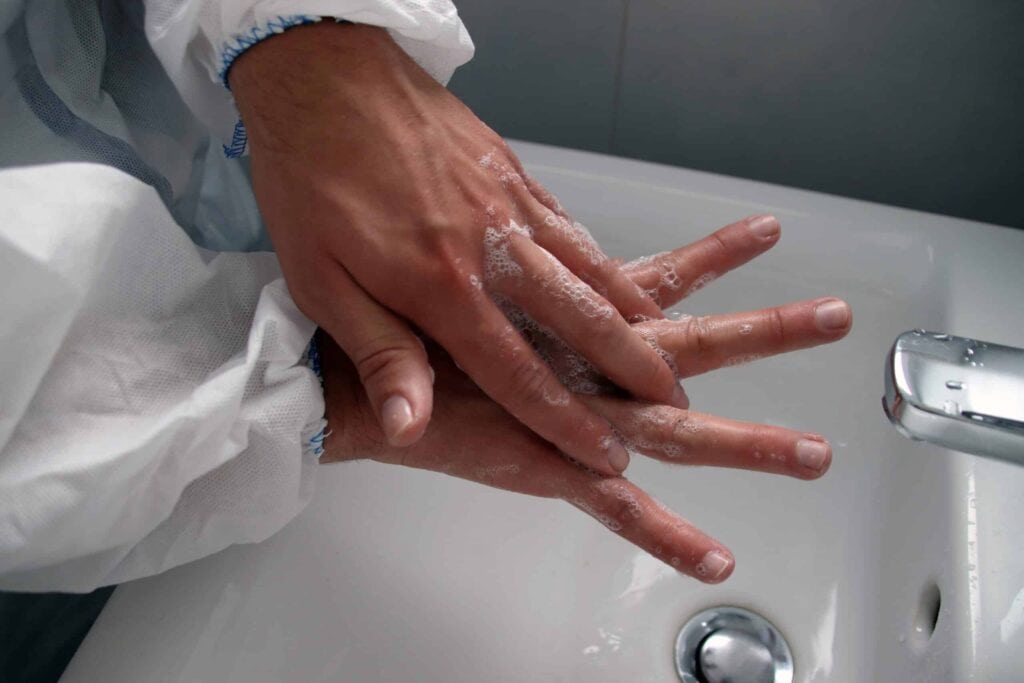Do men or women wash their hands better? This is a seemingly inconsequential query, yet it has noteworthy consequences in terms of public health.
We’re not just talking about basic hygiene practices here. The way we wash our hands has implications for disease control and overall wellbeing.
You’d be surprised to know how much our hand washing habits can differ based on gender. Do men or women wash their hands better?
Intriguing, isn’t it? So let’s dive deeper into this topic and explore what various studies have to say about these washing tendencies among different genders.
Hand Hygiene and Public Health
The power of hand hygiene in the realm of public health is remarkable. This simple act plays a monumental role in halting infectious diseases.
The Role of Regular Handwashing in Disease Control
How can we effectively eliminate germs, avoid illness, and prevent germ spread to others? The answer lies with regular handwashing—a method endorsed by the Centers for Disease Control and Prevention (CDC). Once you understand the germ theory—that microorganisms can cause disease—you’ll realize why frequent handwashing is vital.
In an interesting turn during the early days of the COVID-19 pandemic, both men and women increased their handwashing frequency. This not only protected them personally but also played a significant role in broader disease control efforts.
A healthy approach to hand hygiene goes beyond washing hands after using the restroom or before meals—it includes cleaning your hands after contact with potentially contaminated surfaces like door handles or elevator buttons—basically anytime you think you might have encountered germs.
This highlights how personal actions, such as maintaining good hygiene, can positively impact wider public health goals. As we navigate through this global pandemic, let’s remember that each instance of proper hand hygiene helps protect ourselves while contributing to the protection of our community as well.
The Gender Gap in Handwashing
Now that we’ve covered general trends related to this crucial habit, let’s explore differences across demographic groups, including gender split. In our next section, we’ll dive into Bradley Corp.’s annual Healthy Hand Washing Survey findings regarding variations between men’s and women’s attitudes toward hand hygiene.
Here’s an interesting twist – according to Bradley Corp.’s annual Healthy Handwashing Survey, women have surpassed men in the hand hygiene game. It seems that even when it comes to cleanliness habits, there is a gender split.
“Men have seen their average daily hand washes halve from about 10 times down to just five. Women, on the other hand, have also reduced their frequency but have held on stronger than the gents.”
– Data derived from Bradley Corp.’s survey
This shift highlights how our personal hygiene practices can vary greatly, not only based on individual habits and attitudes but also influenced by factors like gender.
Factors Affecting Handwashing Habits
Let’s move beyond gender and explore other factors that shape our hand hygiene behaviors. Media coverage of health crises such as flu outbreaks or pandemics like Covid-19 significantly influences people’s approach to cleanliness.
- Influence of News: Public health emergencies covered extensively in the media have an impact on the sanitation routines of both genders. According to data shared by Jon Dommisse in New York City reports, 42 percent of women and 39 percent of men were affected.
- Variation between Genders: The effect was slightly more pronounced among females, suggesting a higher sensitivity to public health news or a better responsiveness to behavior change stimuli compared to males.
Impact of Media Coverage on Hand Hygiene Practices
A deeper analysis of this phenomenon reveals intriguing insights: news about diseases alters people’s perception of risk, leading them to modify personal habits, including those related to cleanliness.
Next, we’ll delve further into these external influences that impact our hygienic practices. How do they shape us? And what does this mean for overall public health?
Who’s the hand hygiene champ? According to Bradley Corp.’s survey, women have outshone men in this arena. The media also plays a role in shaping our cleanliness habits, with public health news prompting more pronounced behavior changes among females. This dance of gender and external influences highlights the complexity of personal hygiene practices.
Factors Affecting Handwashing Habits
Hand hygiene is crucial, especially during health crises. But what influences our hand-washing habits? One significant factor is media coverage.
The Role of Media Coverage on Hand Hygiene Practices
Media coverage, such as headlines about flu outbreaks and Covid-19, has a significant impact on our hand-washing habits. According to Bradley Corp., a major player in bathroom fixtures, media coverage plays a crucial role in shaping our behavior.
New York City, known for being the city so nice they named it twice, provides a clear example of how media coverage affects hand hygiene. The constant news stories during the recent pandemic served as reminders to the city’s bustling population about the importance of proper hand hygiene during a crisis.
In their annual Healthy Hand Washing Survey, Bradley Corp. Bradley Corp.’s Healthy Hand Washing Survey revealed that media coverage of the pandemic led to increased handwashing awareness among 42 percent of women and 39 percent of men. This demonstrates the power of information in driving public behavior changes.
A Tip Of The Hat To Jon Dommisse
We would like to acknowledge Jon Dommisse at Bradley Corp. for his contributions. As the Director of Strategy & Corporate Development, he has played a vital role in providing insights into human cleanliness behaviors in various situations.
Now that we understand the factors influencing our hand-washing practices, such as media influence, let’s delve into two commonly used methods for maintaining clean hands: sanitizers and soap. We will explore their effectiveness against germs and identify scenarios where one method may be more effective than the other.
Hand Sanitizer vs. Hand Washing: The Ultimate Clean-Off
Have you ever wondered about the showdown between hand sanitizer and hand washing? Which one reigns supreme in the battle against germs?
Let’s delve into this cleanliness conundrum and determine whether soap or sanitizer takes the crown.
Battle of Effectiveness: Sanitizers Vs Soap
In the first round, let’s examine how these two contenders tackle germs. Soap takes a physical approach, scrubbing away grime and germs as you rinse with water.
Hand sanitizers, on the other hand, go straight for the kill. They use alcohol to destroy certain types of bacteria and viruses upon contact. Still, it’s worth noting that sanitizers or soap may not be able to eradicate all bacteria and hazardous chemicals.
The Right Scenario For Using Sanitizers Or Soap
Now, let’s move on to round two – choosing the appropriate champion based on the situation. If your hands are visibly dirty, covered in muck or grease, then soap is your hero. Nothing beats a good old scrub when dealing with stubborn dirt.
If you find yourself in a situation like an outdoor festival where restroom trailer rentals are more common than sinks, reaching for that bottle of hand sanitizer can quickly combat some bacteria and viruses on your hands.
No matter who emerges victorious in this epic battle between soap and hand sanitizer, both play crucial roles in maintaining hygiene standards. It’s simply a matter of knowing which one to utilize depending on the circumstances.
The Importance of Proper Drying After Washing Hands
Did you know that washing your hands is only half the battle in maintaining proper hand hygiene? Yes, indeed. The other vital step often skipped or done hastily is drying your hands correctly.
Why Hand Drying Shouldn’t Be Ignored?
Why is it important to take the time for this latter part of handwashing? Here’s a fun fact: damp hands are excellent carriers for bacteria. So if you’re not doing justice to drying those freshly washed palms and fingers, there’s still a chance you might be spreading germs around.
Intriguingly enough, studies show that men outperform women when it comes to drying their hands more thoroughly – 70 percent versus 63 percent respectively. These figures indicate room for improvement across the board while emphasizing everyone needs education on effective hand-drying techniques.
Making Your Hand Drying Count.
You must be wondering how exactly can one ‘improve’ at something as simple as hand-drying? Well, here’s how:
- Paper Towels: These are great at absorbing water quickly and help scrub off any stubborn microbes lingering on your skin surface after washing.
- Air Dryers: If paper towels aren’t within reach, air dryers work too. Just ensure all areas of your hand get some air time before moving along with your day.
- Cloth Towels: At home where these are commonly used – remember they need regular changing. Why so? Because damp towels can become cozy homes for bacteria over time.
No matter which method catches your fancy or fits into different situations, always bear in mind that thoroughness makes all the difference when it comes to keeping those pesky germs away from our loved ones and ourselves.
FAQs in Relation to Do Men or Women Wash Their Hands Better?
Hand Hygiene: Do Men or Women Wash Hands Better?
Uncover who masters hand hygiene: men or women? Delve into survey results, gender habits, and the impact on public health.
Which gender washes their hands more?
Women tend to wash their hands more frequently than men, according to the Bradley Corp.’s annual Healthy Handwashing Survey.
What percentage of men wash their hands after using the bathroom?
The percentage varies by study and location. However, a 2023 YouGov survey found that about 80% of American men reported washing their hands every time they use the restroom.
Why should men prioritize handwashing?
Just like anyone else, men should regularly wash their hands to prevent the spread of harmful germs that can lead to diseases such as colds, flu, or food poisoning.
Who should practice good hand hygiene?
All individuals, regardless of age or gender, need to prioritize good hand hygiene. Regularly washing your hands is key in preventing disease transmission and maintaining overall health.
Conclusion
Maintaining clean hands is a critical component of public health, with frequent handwashing being an essential part of controlling communicable illnesses.
The gender gap in handwashing has seen some fluctuations, but recent surveys suggest women have reclaimed their lead in diligence.
Various factors influence our hand hygiene habits, from media coverage to personal beliefs. So do men or women wash their hands better? It’s clear that both genders could improve!
While sanitizers offer convenience and quick germ-killing action, nothing beats the thoroughness of good old soap and water for cleanliness.
Drying your hands properly after washing them is just as important – something men seem to be doing slightly better than women at present.
If you’re looking for restroom trailer or shower trailer rentals across the United States where proper sanitation practices can be upheld by all users regardless of gender differences in habits, Stahla offers top-notch solutions. Make sure everyone keeps up with their hand hygiene when using communal facilities. Visit Stahla Services today to explore our offerings!



